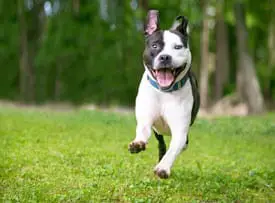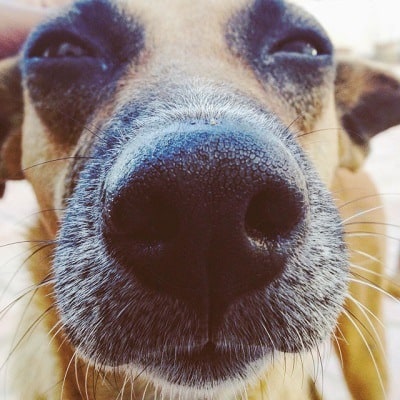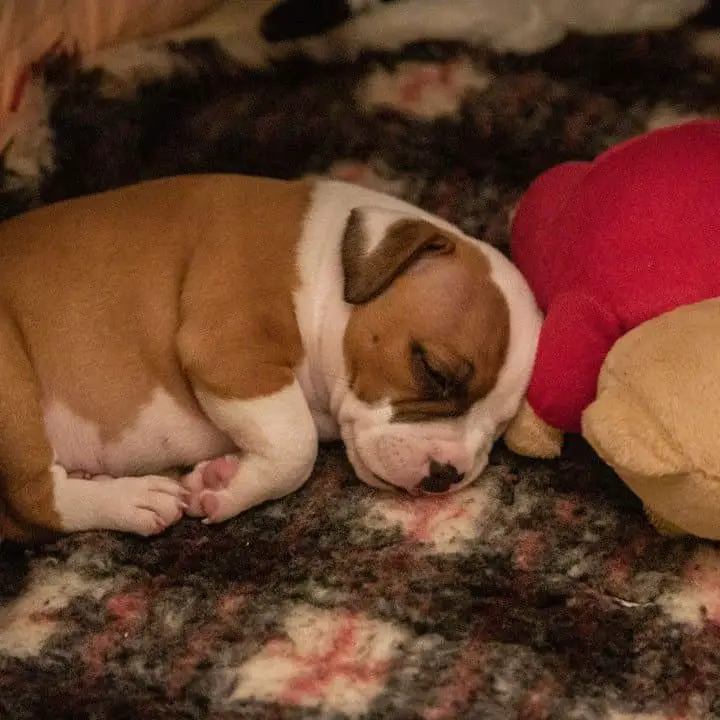Last Updated on 11/05/2020 by Veronica Jones
Puppies seem to do everything fast- they eat fast, run fast, even fall asleep fast! But there are some things that puppies aren’t necessarily meant to do fast, one of which is breathing. Let’s find out some of the causes behind your puppy breathing fast, when it’s okay, and when you need to do something about it.
A Normal Puppy Respiration
Before you decide if you’re puppy is breathing fast, it’s important to know what’s considered normal. First off, every dog is different, so there’s going to be a range in respiratory rates due to age, health status and activity levels. Most adult dogs take between 10 and 30 breaths per minute, while puppies are a little faster at 15 to 40 breaths per minute.
 Taking your puppy’s respiratory rate can easily be done, all you need a completely relaxed pup, this is usually easiest when they’re asleep, and a watch. Count how many times your puppy’s chest puffs up and then shrinks down in one minute. Each chest inflation and deflation is one breath. For a more accurate rate, do this count several times throughout the day and take an average.
Taking your puppy’s respiratory rate can easily be done, all you need a completely relaxed pup, this is usually easiest when they’re asleep, and a watch. Count how many times your puppy’s chest puffs up and then shrinks down in one minute. Each chest inflation and deflation is one breath. For a more accurate rate, do this count several times throughout the day and take an average.
The respiratory rate isn’t the only factor you need to look at when you’re trying to decide if a puppy is breathing fast, you also need to take notice of the amount of effort each breath takes. Normal breathing is basically effortless and quiet. The chest should expand and retract without the help of the stomach muscles and there should be very little noise as air moves through the nose or mouth and down into the lungs. A puppy may breathe with their mouth slightly open but shouldn’t be trying to force air in or out.
Normal Causes for a Puppy to be Breathing Fast
You’ve checked and double checked your watch and it certainly appears that your puppy is breathing fast, but before you start calling the emergency vet, it’s important to realize that there are some normal reasons for elevated respiration.
Heat
Panting is the main way that a dog cools itself, they don’t sweat the way that humans do. Panting brings air in through the nose and out the mouth. As the air leaves the mouth, it evaporates some saliva to help cool the body. Panting dogs can take upwards of 400 breaths a minute! If you notice that your puppy is breathing fast due to heat, cool them off. Bring them indoors if they’ve been out in the hot sun, offer them cool water, and let them relax. You may also notice thick coated puppies panting while indoors with the heat on. Give them a cool place to go to keep them from panting or overheating.
Activity
 If you ran around at the same rapid pace that your puppy does, you’d breath faster too. Activity and exercise will increase your puppy’s respiratory rate. That rate should decrease as your puppy quiets down. The other side of this is over-exertion. A puppy that has over-exerted themselves will experience the same basic reactions as when they’re overly hot. Be sure to cool them down slowly and keep them quiet and calm.
If you ran around at the same rapid pace that your puppy does, you’d breath faster too. Activity and exercise will increase your puppy’s respiratory rate. That rate should decrease as your puppy quiets down. The other side of this is over-exertion. A puppy that has over-exerted themselves will experience the same basic reactions as when they’re overly hot. Be sure to cool them down slowly and keep them quiet and calm.
Stress
If you’ve ever walked into a job interview and could’t seem to keep your hands from trembling or your heart from racing, then you’ve experienced a stress response. Your puppy’s response is no different. When some young dogs are faced with a new and different situation, for example a new home or their first veterinary visit, their breathing rate may increase. It is their body’s way of preparing them for that fight or flight response since they don’t know what to expect. Do your best to calm them with gentle petting and soft words. Let them take their time to explore their new surroundings and try not to force them into anything until they are ready.
Sleeping
While it may seem a little counterintuitive, sleep can actually cause your puppy to breathe faster. This increase in respiratory rate usually occurs during the dream phase, which is about halfway through their sleep cycle. While they’re trying to catch that rabbit, you may also notice them paddling their feet, twitching, or making noises.
Medical Causes for a Puppy to be Breathing Fast
Along with those natural causes for your puppy to be breathing fast, there are a few medical issues that can have them panting, huffing, or puffing. If your puppy’s faster breathing can’t be explained by any of the above causes, look into some of these.
Fever
Similar to your dog being too hot, running a fever can have your puppy breathing faster. It is their attempt to try to cool themselves down. If your puppy has a fever for longer than 24 hours or is showing other signs, such as vomiting, diarrhea, lethargy, or a decreased appetite, you should see your veterinarian.
Pain
Pain and discomfort can be a reason that your puppy is breathing faster. Since most puppies are too young to be experiencing chronic conditions like arthritis or any of those age related issues and they tend to play a little rough, look for a recent injury as their cause of faster breathing. Pain can also come from their digestive system as puppies are famous for eating anything and everything that might not agree with their guts.
Dyspnea

This term simply means labored breathing. With dyspnea, not only is your puppy breathing faster, they’re also breathing with difficulty. You may notice that their stomach muscles are working in and out when they breathe or that their mouth and nostrils are open wide. You may also hear wheezing, whistling, or gurgling when they take a breath. Dyspnea can be caused by a number of things both in the upper airways as well as in the lungs and the rest of the body.
- Nose: Foreign objects, such as grass seeds, can become stuck in the nose and be a cause of a puppy breathing faster. Viral and bacterial infections of the nasal passageways and the sinuses can lead to congestion that affects their breathing as well.
- Throat: Since puppies can be indiscriminate eaters, meaning that some tend to inhale everything that sort of resembles food, foreign objects can become lodged in the throat and cause a puppy to breath faster. Tracheal collapse is an issue that most commonly affects smaller breeds where the trachea constricts when the puppy becomes excited and makes it hard to move air through. Unfortunately, the harder it is to breathe, the more stressed they get, making it even harder to breathe. For puppies with tracheal collapse, calming them down usually returns their breathing to normal.
- Lungs: Infections, such as pneumonia, can lead to congestion of the lungs and cause a puppy to breath faster. Puppies with lung infections typically are very sick, so breathing fast won’t be their only symptom. Congenital diseases of the heart, such as a PDA, can also lead to an increased respiratory rate. Any sort of injury or trauma to the chest or chest cavity not only causes pain, but can also lead to congestion of the lungs and therefore faster breathing.
- Overall body: A puppy breathing faster may be the result of something systemic, such as anemia due to a heavy parasite load. Allergies can even cause a puppy to breath faster as the inflammation in the lungs and airways makes it harder to take a breath.
- Brachycephalic dogs: We all love dogs with a smushed face, think Pug, Bulldog, Pekinese. Unfortunately, that smushed face comes at a price and your little brachycephalic puppy may breathe fast because of it. These breeds of dogs have anatomical differences in their airways that make breathing a little more challenging.
What to do if Your Puppy is Breathing Fast
Your first concern when your puppy appears to be breathing fast is to find out why. If they recently returned from a romp outside or the scary mailman just rang the doorbell, chances are they just need a minute to calm down. If, however, your puppy’s fast breathing isn’t slowing down or they appear to be in distress, it’s time to get to a veterinarian. Most sudden cases of dyspnea are emergency type situations. Even if your puppy’s fast breathing isn’t sudden, you should still get to a vet sooner rather than later.
Your veterinarian will want a detailed history of when and how long your puppy has been breathing fast and what, if anything, seems to help it. They will then do an exam complete with listening to the heart, lungs, and possibly stomach. X-rays and blood work may be required in the case of an infection or foreign object. Treatment will depend on the underlying cause, but may include antibiotics, anti-inflammatories, bronchodilators, removal of a foreign object, or in the case of brachycephalic dogs, surgery. If your puppy’s breathing trouble is severe enough, oxygen may be given through a mask or by putting your pup in an oxygen cage until they’re more stable.
Most dog owners act like new parents when they get a new puppy, and with just cause, they’re your babies! Keeping a close eye on your puppy’s respiratory rate and habits is an important part of that ‘newborn’ phase. Get used to what’s normal for your puppy and be ready to identify when something is not. Being able to determine if your puppy is breathing fast for a normal or abnormal reason is important as well to help you decide when you need to seek help and when your puppy just needs a timeout to cool down.

